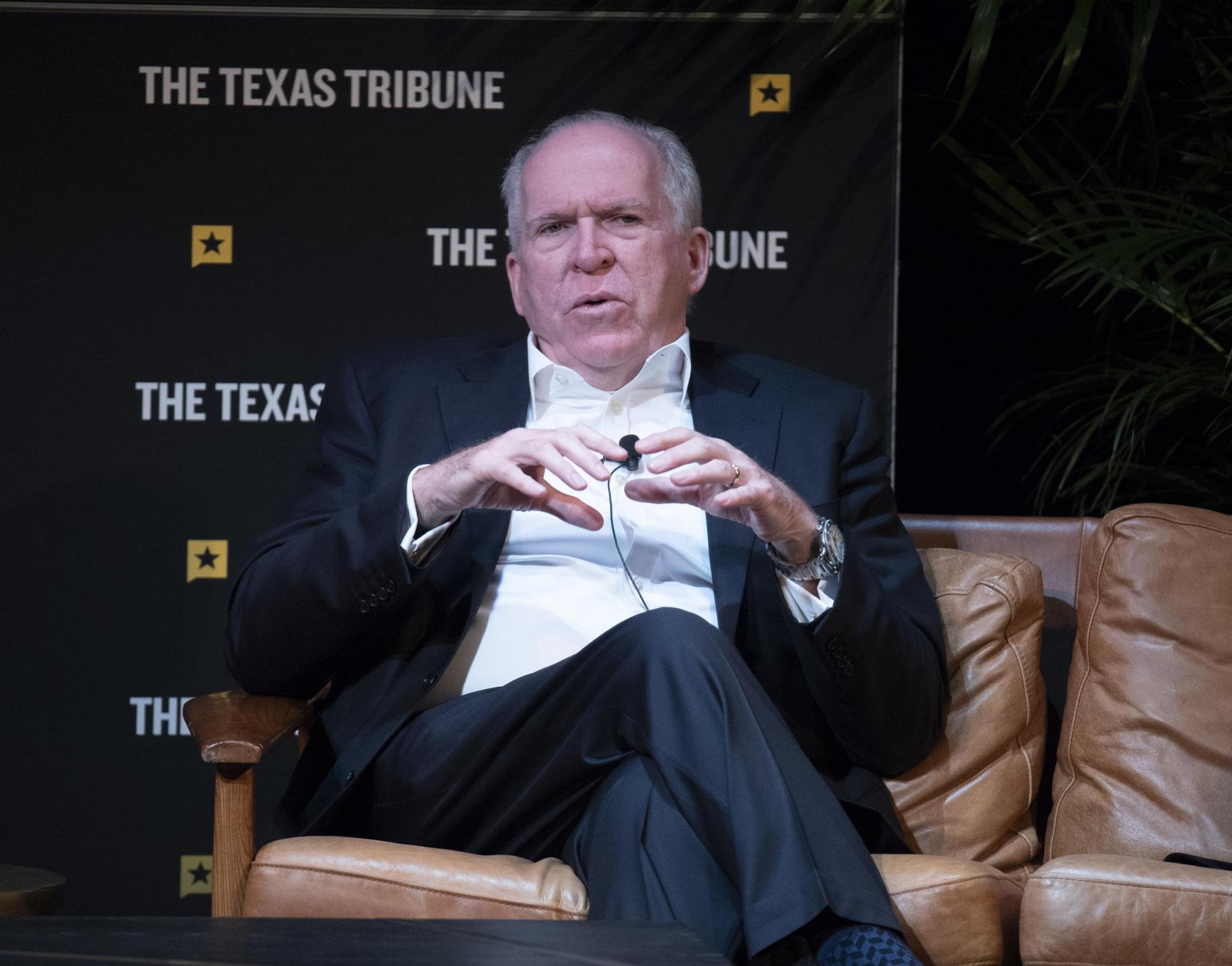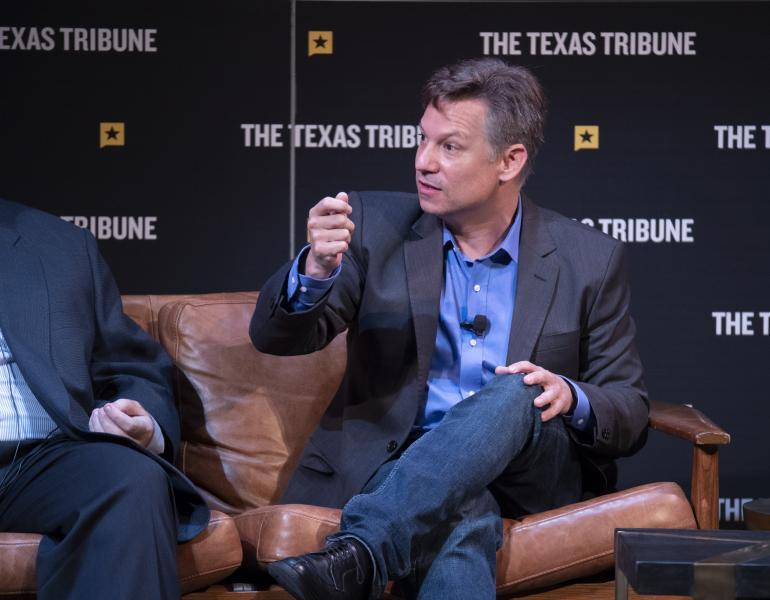
Former CIA Director John Brennan was a member of the Threat Assessment Panel at The Texas Tribune Festival. Photos by Bob Daemmrich Photography Inc.
Assessing terror risk
How great is the terrorist threat for the United States, and what steps can be taken to reduce radicalization? At the Texas Tribune Festival, those questions were among the subjects during a panel discussion moderated by Clements Center for National Security at the University of Texas-Austin Executive Director William Inboden. The panel included Nicholas Rasmussen, former National Counterterrorism Center director and current senior director for counterterrorism at the McCain Institute for International Leadership; Richard Engel, chief foreign correspondent for NBC News; former CIA Director John Brennan; and former U.S. Special Operations Commander Adm. William McRaven.
Inboden asked the panelists about what they considered the United States’ greatest accomplishments and failures since 9/11.
“I think the biggest accomplishment is pulling the interagency together,” McRaven said, noting that before 9/11, information sharing among various agencies was not very well connected. Within a few years, however, “Everybody passed intelligence, passed law enforcement information, in a way that would make the American people proud.”
Brennan agreed that the ability to move intelligence very quickly is an accomplishment but said the United States now needs to do more to address “the environmental circumstances” that lead to radicalization.
Engel pointed out that there is still a conflict in Afghanistan and a covert war going on.
“I think we accomplished decimating al Qaeda,” he said, “but we created a lot of enemies at the same time.”
Rasmussen said that the United States has done well in protecting itself better since 9/11.
“We’ve created a much more effective architecture in protecting Americans,” he said. “... There’s no question that we are a harder target.”
However, Rasmussen said, “Have we done enough to change conditions to address factors that lead to radicalization? … The answer is clearly no. I don’t want to blame us entirely for that … but if we don’t make that effort … we will be dealing with some form of this problem in perpetuity.”
Kinds of Threats
McRaven said that vigilance is always necessary.
“My concern always with terrorism is, we have to get it right 100 percent of the time; they only have to get it right once,” he said.
Regarding Russia and China and the political and economic threats they pose to the United States, McRaven said, “You will see the indicators. It is a big machine. … The problem with terrorism, whether it’s homegrown terrorism or international terrorism, is we may not have those indicators until something blows up.”
Engel said that terrorists always look to have “an impact that is larger than the act itself,” and he believes that right now the United States could be particularly vulnerable.
“Right now, because of the divisions in our society … I imagine very easily that terrorists would see this as a good time to carry out an attack,” he said. “... I worry that right now because of all of that’s going on in our politics, we might be more susceptible to a shocked system.”
Inboden asked about the threat that Russia poses. Rasmussen said that there is no agreement on the type of threat coming from Moscow, so Washington has not developed the tools needed to fight back. He said that Russia’s involvement in the U.S. political system constitutes “a kind of threat we did not face during the Cold War.”
Engel summed up his ideas on Russia using a series of numbers: 400, 70, 10 and 20. For 400 years, he said, Russia was a monarchy. Then it had 70 years of the totalitarian Union of Soviet Socialist Republics, from Lenin to Gorbachev. Then, in the 1990s, that system collapsed in an event that Engel said Putin considered extremely traumatic.
“By the way,” Engel said, “it came crashing down largely, from the Russian perspective, because of our actions. … They blame us for that.”
Under Boris Yeltsin, Engel said, Russia had 10 years of flirting with democracy and a rise of gangsterism. But for the last 20 years, most of which the United States has spent fighting the Global War on Terror, Engel said Russia’s intelligence services have re-emerged.
“For the last 20 years, Russia has been run once again by its intelligence services,” he said, “and what do you think they’ve been thinking about?”
Engel also said he believes Russia interfered in the 2016 U.S. elections, but, “The question is how. … Did they change (votes) in the voting machines, or did they change them in people’s minds?”

William Inboden moderates the Threat Assessment panel with speakers John Brennan, Richard Engel, William McRaven and Nicholas Rasmussen at The Texas Tribune Festival on Sept. 28.
Addressing the Causes
The panelists also discussed the factors that contribute to terrorism and ways the United States can address those factors. Brennan said that for many years, the United States was a voice of reason, holding authoritarian leaders responsible. Without that, he said, the world is more susceptible to “this incubation of extremism, violence and terrorism.”
He also said that political and economic factors can lead to radicalization.
“I don’t want to give the impression that it’s very easy to take care of these situations and circumstances,” he said, but the United State should pay attention to them. “It is what we do in the villages of Pakistan or Egypt or wherever so that you don’t have those forces of terrorism gaining traction and root and gaining more adherents.”
McRaven said that it is crucial to remain engaged with other countries and to build the diplomatic corps back up. He also noted the importance of foreign aid.
“Foreign aid is about us,” he said. “Anybody who thinks it’s altruistic … there is some altruism but more, it is the more stable we can make that country … the better it is for us.”
Engel said he believes education is necessary to stopping the spread of terrorism.
“I think the root cause of so much of the problems is ignorance, is anger,” he said. “If people don’t know enough, they’re easily manipulated, they’re easily enraged. … The more girls in school, the more people in school, the better we are.”
McRaven — who is former chancellor of the University of Texas system — agreed about the importance of education.
“I think the number one national security threat in the United States is K-12 education,” he said, adding that young people should have an understanding of the world around them, be exposed to new ideas and learn to think critically.
“If I had to look at one silver bullet for the solution … we know it’s not poverty. You look at Haiti; Haiti is the poorest country in the Western hemisphere and it’s not a hotbed of terrorism. And the 9/11 bombers came from fairly sophisticated, well-off families,” he said. “There really isn’t, I think, one kind of root cause for a lot of things out there, but if I had to invest in one area in order to change the fabric of the international community it would be in education not only for our friends and allies but right here at home.”











